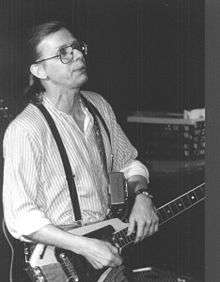Gerhard Gundermann
| Gerhard Gundermann | |
|---|---|
 Gundermann in 1994 | |
| Background information | |
| Birth name | Gerhard Rüdiger Gundermann |
| Also known as | Gundermann |
| Born |
21 February 1955 Weimar |
| Origin | Hoyerswerda, East Germany |
| Died |
21 June 1998 (aged 43) Spreetal |
| Genres | |
| Occupation(s) | Excavator operator |
| Instruments | Guitar |
| Years active | 1986–1998 |
| Labels | SPV |
| Associated acts | Gundermann & Seilschaft |
| Website |
members |
Gerhard Rüdiger Gundermann, who generally performed as simply Gundermann (February 21, 1955 – June 21, 1998), was a German singer-songwriter and rock musician. An excavator operator, his musical career began in the former East Germany, where he became known for his clever, often melancholy lyrics imbued with social commentary. After German reunification, he became especially popular among former East Germans who felt disenfranchised in the reunited country.
Career
Born in Weimar, Gundermann moved with his family to Hoyerswerda in 1967. After completing his secondary education, he studied for a year at the military academy in Löbau, but was expelled in 1975, after which he was forced to seek work in the coal mining area of the Spreetal (in today's Brandenburg). In 1976 he began night school, and was recruited by the East German secret police, the Stasi (codename "Grigori"). In 1977 he applied to join the ruling party, the SED, but was asked to leave the following year (after expressing contrary opinions), although this was reduced to a "strong rebuke" after he appealed. In 1983 he married Conny. The following year he was again expelled from the party and also from the Stasi.
Gundermann's first appearances as a singer-songwriter came in 1986, and a year later he won the grand prize and a recording contract in the East German national song contest. His first LP Männer, Frauen und Maschinen (Men, Women, and Machines) appeared in 1988, but in contrast to his solo acoustic performances it was a rock record with a backing band, with uptempo numbers like "Halte durch" (Keep Up). It included an ode to his hometown, Hoyerswerda, "Hoy Woy."
After the fall of the Berlin Wall, Gundermann ran unsuccessfully for a seat in the Volkskammer in the March 1990 elections, running for the leftist alliance Aktionsbündnis Vereinigte Linke.
Gundermann lived an ascetic lifestyle, eschewing alcohol,[1] drugs, and smoking, and was a committed vegetarian.[1] However, he was a workaholic, and slept little; besides a full recording and performing schedule, Gundermann continued to work operating a giant excavator, digging up seams of brown coal; he was worried that his music would lose its authenticity if it became his sole way of life. Perhaps because of overwork, Gundermann died of a stroke on June 21, 1998 at the age of 43 at his home in Spreetal. He left behind four children. His death followed that of his friend and collaborator Tamara Danz, also 43, by less than two years.
Discography
- 1988 Männer, Frauen und Maschinen (Men, Women, and Machines)
- 1992 Einsame Spitze (One Of A Kind)
- 1993 Der 7te Samurai (The Seventh Samurai)
- 1995 Frühstück für immer (Breakfast For Ever)
- 1997 Engel über dem Revier (Angel Above the Coalfield)
- 1998 Krams – Das letzte Konzert
- 1999 Unplugged (Silly + Gundermann & Seilschaft)
- 2000 Live-Stücke I (currently unavailable due to a legal dispute)
- 2004 Werkstücke II. Die Wilderer
- 2005 Torero... Werkstücke III (Solo/live)
- 2005 Oma Else. Werkstücke IV
- 2008 Alle oder Keiner. Auswahl I
References
- 1 2 "Sänger ohne Schutzengel" (in German). Der Spiegel. June 29, 1998. Retrieved May 20, 2016.
Sources
- Gerhard Gundermann. Rockpoet und Baggerfahrer. Gespräche mit Hans-Dieter Schütt. Schwarzkopf & Schwarzkopf Verlag, 1996 and 1999. ISBN 3-89602-055-2
- Mario Ferraro. Das Liederbuch. (42 Gundermann song lyrics with annotations.) Buschfunk Musikverlag. ISBN 3-931925-34-X; Part 2: ISBN 3-931925-35-8
External links
| Wikimedia Commons has media related to Gerhard Gundermann. |
- Gundermanns Seilschaft (Official site in German)
- Gundermanns Seilschaft eV. Fan site in German
- Lyrics in German